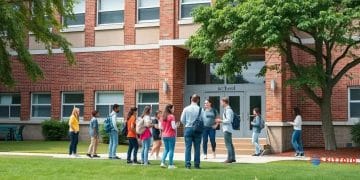Private school tuition vouchers: do they really help?

Anúncios
Private school tuition vouchers provide families with financial assistance to choose private education, enhancing educational options but potentially impacting public school funding and equity in access.
Private school tuition vouchers have sparked conversation among educators and parents alike. What are their true benefits, and do they really level the playing field in education? Let’s dive into this topic to see the broader implications.
Understanding private school tuition vouchers
Understanding private school tuition vouchers is crucial for parents exploring educational options for their children. These vouchers offer financial assistance, allowing families to enroll their children in private institutions, often with the goal of improving educational outcomes.
Anúncios
Vouchers are a way for families to exercise choice in education. By granting funds that can be used for private school expenses, they aim to provide opportunities that might otherwise be limited due to financial constraints. However, this system has both supporters and critics.
The purpose of tuition vouchers
Tuition vouchers were created to enhance educational choice. They encourage competition among schools, ideally leading to improved standards in both public and private sectors. Supporters believe this competition fosters better educational environments and outcomes.
Anúncios
Key benefits of private school tuition vouchers
- Increased access to quality education for low-income families.
- Improved student performance through diverse educational settings.
- Encouragement for public schools to innovate and improve their offerings.
Additionally, private school tuition vouchers can lead to increased parental involvement in children’s education. When families choose schools, they often become more engaged, understanding better the importance of education and their child’s individual needs.
It’s also important to consider the funding aspect. Vouchers typically redirect public funds allocated for a child’s education to the private school of choice. This can raise concerns regarding the impact on public school budgets and the potential for resource disparities.
In examining the implications of vouchers, understanding their structure and allocation is vital. These factors shape how effectively vouchers can fulfill their intended purpose of enhancing educational access.
Finally, further exploration into how various states implement and regulate these vouchers can provide insights into their effectiveness and sustainability over time.
The impact of vouchers on public schools

The impact of vouchers on public schools is a subject of considerable debate. As private school tuition vouchers gain popularity, their effects on public education systems become more significant. One major concern is how these vouchers can affect funding for public schools.
When students transfer to private schools using vouchers, public schools may lose funding based on enrollment numbers. This reduction can lead to fewer resources for remaining students. Schools may struggle to maintain their programs and staff quality due to these budget cuts.
Positive effects of vouchers on public schools
Despite the challenges, some argue that vouchers can foster competition that encourages public schools to improve their offerings. When parents have options, schools may enhance their curriculum and services to attract and retain students.
How public schools can adapt
- Improving teaching standards and methodologies.
- Integrating innovative programs to engage students.
- Enhancing communication with parents and the community.
Moreover, these changes can lead to healthier educational environments where student achievement is prioritized. Teachers and administrators may feel motivated to innovate and incorporate new techniques to stay competitive.
Nevertheless, the long-term effects of vouchers on educational equity need careful consideration. While some schools adapt, others may face decline due to lost funding, which can widen the gap between schools serving affluent families and those in lower-income areas.
In examining the impact, it is essential to explore data from various states and districts that have implemented vouchers. Outcomes may vary, suggesting that a one-size-fits-all solution is not viable in education policy.
Analyzing the benefits for low-income families
Analyzing the benefits for low-income families regarding private school tuition vouchers reveals significant opportunities. For families with limited financial resources, these vouchers can provide access to quality education that may otherwise be unavailable.
Vouchers can break down economic barriers by empowering parents to choose schools that align with their children’s needs. Many low-income families face challenges in accessing quality education due to geographical and financial constraints.
Financial relief for families
Using a voucher can alleviate the financial burden of private school tuition. This is particularly beneficial for households that struggle to cover costs associated with public schooling, such as transportation and materials.
Quality education opportunities
- Access to better educational resources and facilities.
- Smaller class sizes that enable personalized attention.
- Programs tailored to enhance student success.
Moreover, attending a private school can lead to improved academic outcomes. Many private institutions have the freedom to innovate in their teaching methods, offering specialized curricula that can benefit students academically and socially.
Additionally, private schools often emphasize character development and moral values, which can be appealing to families seeking more than just academic excellence. Having a choice in education also empowers parents and encourages active participation in their children’s schooling.
As more low-income families gain access to these options, it’s essential to monitor their experiences. Surveys and studies can provide valuable insights into how these vouchers positively impact educational attainment and overall family well-being.
Debating the effectiveness of private versus public education
Debating the effectiveness of private versus public education is a complex issue that involves many factors. Each system has its advocates, and both have their strengths and weaknesses. A significant part of this debate focuses on academic outcomes and student satisfaction.
Supporters of private education argue that private schools often provide better resources, smaller class sizes, and a more personalized learning experience. This environment can lead to improved academic performance and greater student engagement.
Factors favoring private education
Some key benefits associated with private education include:
- Access to specialized programs tailored to individual student needs.
- More flexibility in teaching methods and curricula.
- Enhanced extracurricular activities, which can enrich student experiences.
In contrast, public schools are designed to accommodate all students, which includes those from various social and economic backgrounds. They often provide essential services like free meals and special education programs, making them vital for many families.
Advantages of public education
Public education has several strengths, such as:
- Wider access for students of all backgrounds.
- Regulations that ensure curriculum standards and teacher qualifications.
- Greater accountability to the community and taxpayers.
As the discussion continues, it’s worth noting the importance of considering factors beyond academic performance alone. Social and emotional development, access to resources, and community engagement also play crucial roles in the overall effectiveness of educational systems.
Ultimately, the conversation around private versus public education continues to evolve as parents and educators seek the best pathways for student success.
Future of tuition vouchers in education policy
The future of tuition vouchers in education policy is a topic gaining traction as various stakeholders consider the long-term implications. With changing political landscapes and shifting perceptions about education funding, the discussion around tuition vouchers is evolving.
Many advocates believe that the continued adoption of vouchers can lead to greater educational options for families. They argue that expanding voucher programs could create competition that pushes both private and public schools to improve their services and outcomes.
Potential policy changes
As more states explore education reform, potential policy changes regarding tuition vouchers might include:
- Expanding eligibility to more families regardless of income.
- Increasing the amount of funding available per student.
- Introducing accountability measures for private schools receiving voucher funds.
Such changes aim to make vouchers more accessible and equitable. However, opponents raise concerns about the potential negative effects on public school funding and resources. They advocate for a solution that balances vouchers with adequate support for public education.
Impact of public opinion
Public opinion plays a significant role in shaping education policy. As awareness of tuition vouchers grows, more families and communities may express their preferences regarding school choice. This could influence lawmakers and educational leaders to reconsider existing policies.
Furthermore, ongoing studies and research are likely to impact how vouchers are viewed in relation to educational outcomes. By tracking the effectiveness of voucher systems, policymakers can make informed decisions that reflect the needs of students and families.
As we look ahead, discussions surrounding tuition vouchers in education policy will remain crucial. These discussions will guide how we approach educational equity and quality in the years to come.
FAQ – Frequently Asked Questions about Tuition Vouchers in Education
What are tuition vouchers?
Tuition vouchers are financial grants provided to families, allowing them to pay for their children’s education in private schools.
How do tuition vouchers affect public schools?
Tuition vouchers can lead to decreased funding for public schools if many students transfer to private institutions, impacting resources and programs.
Who benefits the most from tuition vouchers?
Low-income families often benefit the most, as vouchers provide access to quality education that may be otherwise unaffordable.
What are the potential downsides of tuition vouchers?
Potential downsides include the risk of destabilizing public school funding and creating inequities in educational access.





